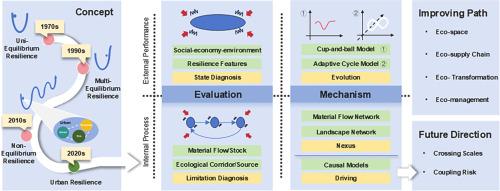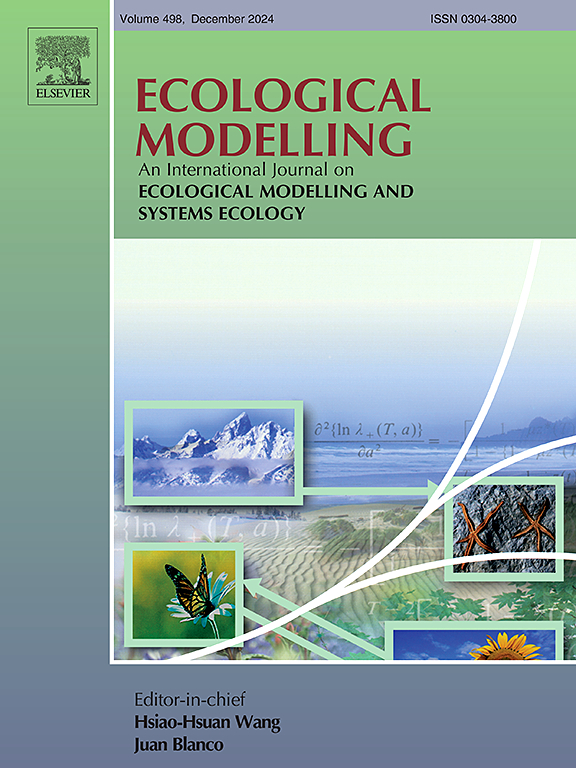城市生态弹性的系统回顾:过程代谢研究的新兴前沿
IF 3.2
3区 环境科学与生态学
Q2 ECOLOGY
引用次数: 0
摘要
在气候变化和社会经济活动加剧的双重压力下,增强城市脆弱生态系统的恢复力已成为可持续发展的关键。城市生态弹性起源于生态弹性理论,并逐步向动态、复合、过程维度发展。目前的研究主要集中在城市生态弹性的概念框架、评价方法和机理分析等方面,缺乏对前沿和热门研究课题的系统综合。因此,本研究以生态弹性理论为基础,通过整体视角和过程视角对城市生态弹性的概念发展进行系统化梳理,同时对当代评价方法、运行机制和经验案例中得出的弹性增强路径进行批判性回顾。研究发现,城市生态弹性的概念演变与库恩的范式周期一致,在库恩的范式周期中,范式转变促进了弹性量化和机制分析的维度框架的发展。未来的研究应优先考虑以过程为导向的城市生态弹性评价与机制分析方法,并将弹性指标系统地纳入生态风险评价框架。这些进步将使被动的弹性反应向主动的、基于过程的监管范式转变。本文章由计算机程序翻译,如有差异,请以英文原文为准。

A systematic review of urban ecological resilience: Emerging frontiers in process-oriented metabolic research
Under the dual pressures of climate change and intensified socioeconomic activities, enhancing the resilience of vulnerable urban ecosystems has become critical for sustainable development. Originating from ecological resilience theory, urban ecological resilience has progressively evolved toward dynamic, composite, and process-oriented dimensions. While current research focuses on its conceptual framework, assessment methodologies, and mechanism analysis of urban ecological resilience, a systematic synthesis of the leading and popular research topics is lacking. Therefore, grounded in ecological resilience theory, this study systematizes the conceptual development of urban ecological resilience through holisticand process-oriented lenses, while critically reviewing contemporary evaluation approaches, operational mechanisms, and resilience enhancement paths derived from empirical cases. We find that the conceptual evolution of urban ecological resilience aligns with Kuhn's paradigm cycle, where paradigm shifts have facilitated the development of dimensional frameworks for resilience quantification and mechanism analysis. Future research should prioritize process-oriented approaches in the evaluation and mechanism analysis of urban ecological resilience and systematically integrate resilience metrics into ecological risk assessment frameworks. Such advancements will enable the transition from passive resilience responses to proactive, process-based regulation paradigms.
求助全文
通过发布文献求助,成功后即可免费获取论文全文。
去求助
来源期刊

Ecological Modelling
环境科学-生态学
CiteScore
5.60
自引率
6.50%
发文量
259
审稿时长
69 days
期刊介绍:
The journal is concerned with the use of mathematical models and systems analysis for the description of ecological processes and for the sustainable management of resources. Human activity and well-being are dependent on and integrated with the functioning of ecosystems and the services they provide. We aim to understand these basic ecosystem functions using mathematical and conceptual modelling, systems analysis, thermodynamics, computer simulations, and ecological theory. This leads to a preference for process-based models embedded in theory with explicit causative agents as opposed to strictly statistical or correlative descriptions. These modelling methods can be applied to a wide spectrum of issues ranging from basic ecology to human ecology to socio-ecological systems. The journal welcomes research articles, short communications, review articles, letters to the editor, book reviews, and other communications. The journal also supports the activities of the [International Society of Ecological Modelling (ISEM)](http://www.isemna.org/).
 求助内容:
求助内容: 应助结果提醒方式:
应助结果提醒方式:


